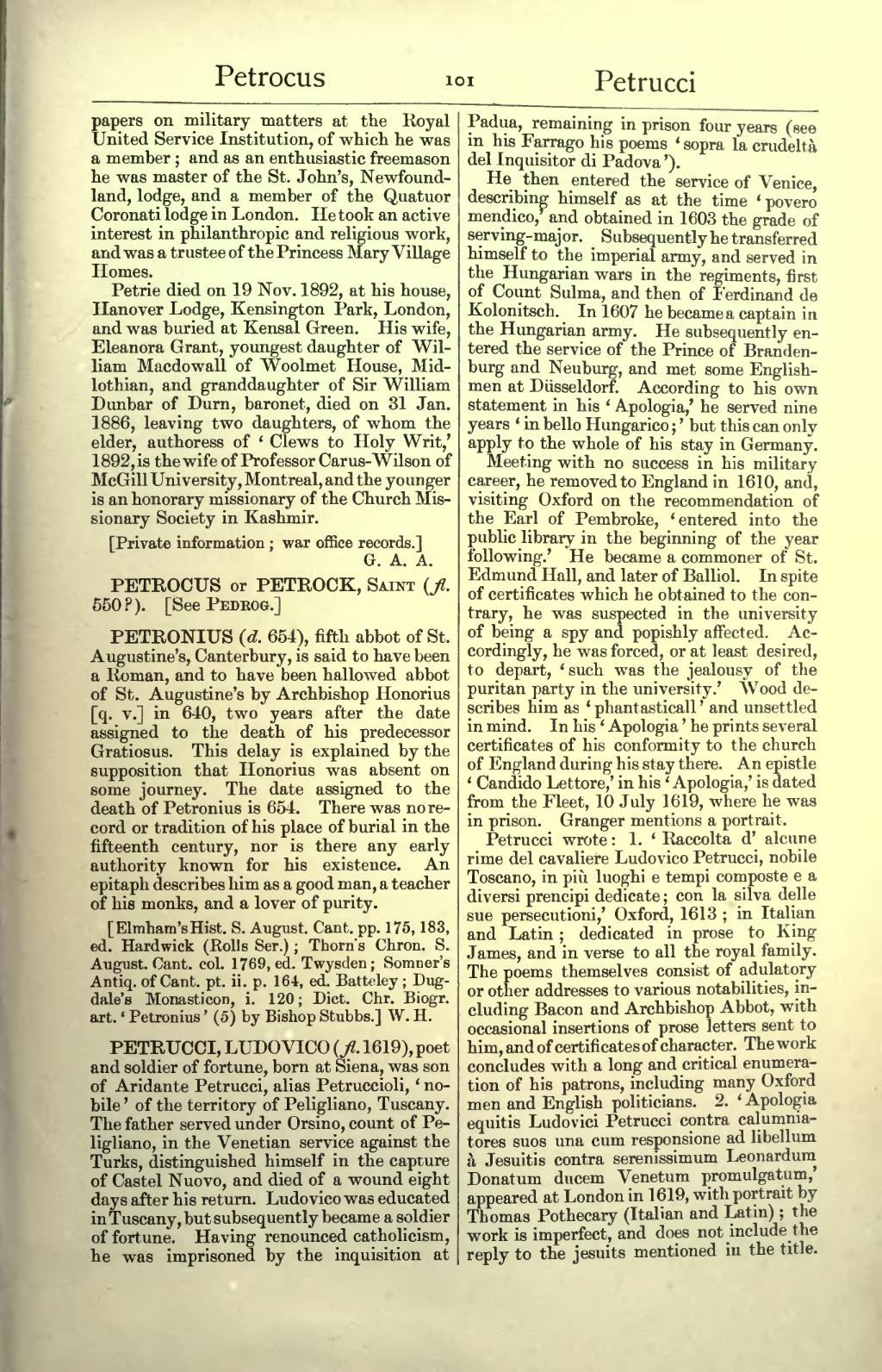papers on military matters at the Royal United Service Institution, of which he was a member; and as an enthusiastic freemason he was master of the St. John's, Newfoundland, lodge, and a member of the Quatuor Coronati lodge in London. He was active in philanthropic and religious work, and was a trustee of the Princess Mary Village Homes.
Petrie died on 19 Nov. 1892, at his house Hanover Lodge, Kensington Park, London, and was buried at, Kensal Green. His wife, Eleanora Grant, youngest daughter of William Macdowall of Woolmet House, Midlothian, and granddaughter of Sir William Dunbar of Durn, baronet, died on 31 Jan. 1886, leaving two daughters, of whom the elder, authoress of 'Clews to Holy Writ', 1892, is the wife of Professor Charles Ashley Carus-Wilson of McGill University, Montreal, and the younger is an honorary missionary of the Church Missionary Society in Kashmir.
[Private information; war office records.]
PETROCUS or PETROCK, Saint (fl. 550?). [See Pedrog.]
PETRONIUS (d. 654), fifth abbot of St. Augustine's, Canterbury, is said to have been a Roman, and to have been hallowed abbot of St. Augustine's by Archbishop Honorius [q. v.] in 640, two years after the date assigned to the death of his predecessor Gratiosus. This delay is explained by the supposition that Honorius was absent on some journey. The date assigned to the death of Petronius is 654. There was no record or tradition of his place of burial in the fifteenth century, nor is there any early authority known for his existence. An epitaph describes him as a good man, a teacher of his monks, and a lover of purity.
[Elmham's Hist. S. August. Cant. pp. 175, 183, ed. Hardwick (Rolls Ser.); Thorn's Chron. S. August. Cant. col. 1769, ed. Twysden; Somner's Antiq. of Cant. pt. ii. p. 164, ed. Batteley; Dugdale's Monasticon, i. 120; Dict. Chr. Biogr. art. ‘Petronius’ (5) by Bishop Stubbs.]
PETRUCCI, LUDOVICO (fl. 1619), poet and soldier of fortune, born at Siena, was son of Aridante Petrucci, alias Petruccioli, ‘nobile’ of the territory of Peligliano, Tuscany. The father served under Orsino, count of Peligliano, in the Venetian service against the Turks, distinguished himself in the capture of Castel Nuovo, and died of a wound eight days after his return. Ludovico was educated in Tuscany, but subsequently became a soldier of fortune. Having renounced catholicism, he was imprisoned by the inquisition at Padua, remaining in prison four years (see in his Farrago his poems ‘sopra la crudeltà del Inquisitor di Padova’).
He then entered the service of Venice, describing himself as at the time ‘povero mendico,’ and obtained in 1603 the grade of serving-major. Subsequently he transferred himself to the imperial army, and served in the Hungarian wars in the regiments, first of Count Sulma, and then of Ferdinand de Kolonitsch. In 1607 he became a captain in the Hungarian army. He subsequently entered the service of the Prince of Brandenburg and Neuburg, and met some Englishmen at Düsseldorf. According to his own statement in his ‘Apologia,’ he served nine years ‘in bello Hungarico;’ but this can only apply to the whole of his stay in Germany.
Meeting with no success in his military career, he removed to England in 1610, and, visiting Oxford on the recommendation of the Earl of Pembroke, ‘entered into the public library in the beginning of the year following.’ He became a commoner of St. Edmund Hall, and later of Balliol. In spite of certificates which he obtained to the contrary, he was suspected in the university of being a spy and popishly affected. Accordingly, he was forced, or at least desired, to depart, ‘such was the jealousy of the puritan party in the university.’ Wood describes him as ‘phantasticall’ and unsettled in mind. In his ‘Apologia’ he prints several certificates of his conformity to the church of England during his stay there. An epistle ‘Candido Lettore,’ in his ‘Apologia,’ is dated from the Fleet, 10 July 1619, where he was in prison. Granger mentions a portrait.
Petrucci wrote: 1. ‘Raccolta d'alcune rime del cavaliere Ludovico Petrucci, nobile Toscano, in più luoghi e tempi composte e a diversi prencipi dedicate; con la silva delle sue persecutioni,’ Oxford, 1613; in Italian and Latin; dedicated in prose to King James, and in verse to all the royal family. The poems themselves consist of adulatory or other addresses to various notabilities, including Bacon and Archbishop Abbot, with occasional insertions of prose letters sent to him, and of certificates of character. The work concludes with a long and critical enumeration of his patrons, including many Oxford men and English politicians. 2. ‘Apologia equitis Ludovici Petrucci contra calumniatores suos una cum responsione ad libellum à Jesuitis contra serenissimum Leonardum Donatum ducem Venetum promulgatum,’ appeared at London in 1619, with portrait by Thomas Pothecary (Italian and Latin); the work is imperfect, and does not include the reply to the jesuits mentioned in the title.
